School of Advanced Materials Engineering
Cultivating creative and progressive engineers in the industrial age of the cutting-edge technology
The School of Advanced Materials Engineering studies on the academic theories and industrial applications of materials. We aim to nurture creative engineers having technology development capability in the industrial settings and cultivate an enterprising talent leading the future materials industry.
Our undergraduate program provides comprehensive theoretical education and engineering practicum about the whole process of industry where the basic materials in the key industry, including steel and non-ferrous metals, are produced and manufactured and new materials are developed and processed. In addition, our department has made the utmost efforts to produce an enterprising talent who will lead the materials industry in the future by carrying out research and educating students in the field of 'academic theory and application of polymer and inorganic electronic materials'. The disciplines of materials science cover a wide range of industrial applications embracing the existing steel and non-ferrous materials, aerospace materials, environmental materials, and electronic materials.
Students can pursue their studies with reputable professors who have taught the following courses: 'Materials Physics' that explains electrical, magnetic, and optical properties of materials, 'Electrical Materials', 'Semiconductor Materials Engineering', 'Semiconductor Manufacturing Process', and 'Thin Film Engineering' that are all related to applications in semiconductor manufacturing and evaluation.
The School of Advanced Materials Engineering cultivates outstanding engineers and scientists who are crucial for the key industry by offering engineering courses that satisfy the demands of high-tech industrial settings as well as doing experiments that examine the fundamental principles. With relevant research activities and opportunities, our school also strives to produce research experts who will make significant contributions to developing advanced materials for the future.

- Seoul National Univ., B.S.
- Seoul National Univ., M.S.
- MIT, Ph.D.
- Electronic, Phothonic and Magnetic Materials
dhahn@kookmin.ac.kr
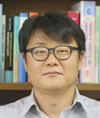
- Seoul National Univ., B.S.
- Seoul National Univ., M.S.
- Seoul National Univ., Ph.D.
- Computational Materials Science
cprdream@kookmin.ac.kr
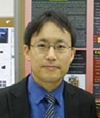
- KAIST., B.S.
- UC Irvine., M.S.
- UC Berkeley, Ph.D.
- Materials Science
heeman@kookmin.ac.kr

- Yonsei Univ.,B.S.
- Yonsei Univ.,M.S.
- Yonsei Univ., Ph.D.
- Metallurgical Engineering
hyunjoo@kookmin.ac.kr

- Seoul National Univ., B.S.
- Seoul National Univ., M.S.
- UC Berkeley, Ph.D.
- Semiconductors and Devices
woongchoi@kookmin.ac.kr
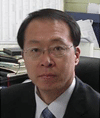
- Hanyang Univ., B.S.
- Osaka Univ., M.S.
- Osaka Univ., Ph.D.
- Chemical Metallurgy and Materials Processing
wgjung@kookmin.ac.kr
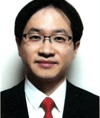
- Seoul National Univ., B.S.
- Seoul National Univ., M.S.
- Seoul National Univ., Ph.D.
- Energy Materials
jaehunkim@kookmin.ac.kr

- Seoul National Univ., B.S.
- Seoul National Univ., M.S.
- Univ. of Texas at Austin, Ph.D.
- Semiconductor Devices and Process
jiyoung@kookmin.ac.kr

- Hanyang Univ., B.S.
- Hanyang Univ., M.S.
- Tokyo Univ., Ph.D.
- Polymer Science
jinyeol@kookmin.ac.kr
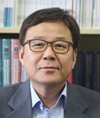
- Seoul National Univ., B.S.
- KAIST., M.S.
- Stanford Univ., Ph.D.
- Mechanical Behavior of Materials
ykim@kookmin.ac.kr

- Seoul National Univ., B.S
- KAIST., M.S.
- KAIST., Ph.D.
- Materials Engineering
hkwon@kookmin.ac.kr

- POSTECH., B.S.
- POSTECH., M.S.
- POSTECH., Doctor of Science
- Polymer Engineering
hyunjung@kookmin.ac.kr
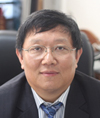
- Seoul National Univ., B.S.
- Seoul National Univ., M.S.
- Vanderbilt Univ., Ph.D.
- Corrosion and Electrochemistry
leejb@kookmin.ac.kr

- Seoul National Univ., B.S.
- Seoul National Univ., M.S.
- MIT Univ., Ph.D.
- Plasma Physics and Application
lgab@kookmin.ac.kr
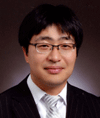
- Seoul National Univ., B.S.
- Seoul National Univ., M.S.
- Seoul National Univ., Ph.D.
- Nano Materials
nohyunlee@kookmin.ac.kr

- Seoul National University B.A.
- Seoul National University M.Eng.
- University of Cambridge Ph.D.
- Materials Physics
mijung@kookmin.ac.kr

- Seoul National Univ., B.S.
- Seoul National Univ., M.S.
- Seoul National Univ., Ph.D.
- Materials Science
hsnam@kookmin.ac.kr

- Seoul National Univ., B.S.
- Seoul National Univ., M.S.
- Univ. of Texas at Austin, Ph.D.
- Ferrous Materials (steel)
wjnam@kookmin.ac.kr
Core Courses
Basic Lab. I to Advanced Materials (3)In this lab course, understanding the basic physical properties of materials and measurement instruments are introduced. Through experiments and practice, students can learn the principles and operations of various experimental tools for characterization of basic physical properties of materials.
Thermodynamics (3)This is a fundamental course for obtaining the knowledge of phase equilibria and the behavior of materials. The content of this course include auxiliary functions, statistical thermodynamics, behaviors of solutions, the equilibrium of chemical reactions, and thermodynamics of phase diagram, etc.
Crystal Structure and Imperfections in Solids (3)The subject treats crystal structure and imperfections in solids. The course aims to relate the topic with material strength and deformation for better understanding of mechanical properties of engineering materials. This course reviews basic crystalline structures and introduces point, line, and two dimensional defects in crystalline. Topics include cubic and hcp structures, structure of dislocation, stress field reaction of dislocation, the relation of point defect, dislocation and the two dimensional defect. Strengthening mechanisms based on the dislocation are also discussed.
Phase Equilibria and Microstructure (3)The concept of phase equilibria, the analysis and the application of phase diagram has been introduced. The theories of diffusion and solidification will be introduced. Mainly, how to use basic theories of phase equilibria, diffusion and solidification to the industrial application will be studied.
Mechanics of Materials (3)Mechanics of materials deals with the mechanical behaviors of materials when they are loaded. Topics include force and moment, the relationship between stresses and strains, mechanical matters on deformation, compression, torsion, bending, beam deflection, and buckling in a practical manner. This course may provide the fundamentals of elasticity and plasticity as well as the theoretical background of mechanical metallurgy and deformation processing.
Basic Lab. II to Advanced Materials (3)Student project teams experience basic experiments on physical, chemical and thermal properties of materials and their relationship with the microstructures. Emphasis on teamwork, project management, communications and computer skills, and hands‐on work at KMU laboratory shops. Teams document their progress and final results by means of bi‐weekly written reports. Instruction and practice in oral communication is provided.
Computer Modeling (3)This course provides the basic concepts of computer modeling in materials science and engineering. It covers techniques and software for simulation, data analysis and visualization, continuum methods to study fundamental physical phenomena encountered in the field of materials science and engineering.
Mass Transport and Microstructures (3)This course is intended to be an introduction to the field of transport phenomena for students of engineering and applied science. It covers the subjects of momentum transport (viscous flow), energy transport (heat conduction, convection, and radiation), and mass transport (diffusion). In this treatment the media in which the transport phenomena are occurring are regarded as continua, and very little is said about the molecular explanation of these processes. Surely, the continuum approach is of more immediate interest to engineering students, although it should be emphasized that both approaches are needed for complete mastery of the subject. Knowledge of the basic laws of mass, momentum, and energy transport has certainly become important, if not indispensable, in engineering analysis. In addition, this class may be of interest to some who are interested in physical chemistry, solid physics, meteorology, and biology.
Mechanical Behavior of Solids (3)This course introduces the basic concept of deformation and fracture of engineering materials. The strength and deformation is one of the most important materials characteristics of structural materials for broad application in industry. The effects of microstructure and defects of materials on deformation and fracture are treated on the basis of materials science. Topics include elasticity and plasticity theory, strengthening mechanisms of metals, tensile behaviors, fracture, and fatigue.
Phase Transformations in Materials (3)The microstructure of condensed matter is dependent upon temperature, pressure, thermal history, and other variables. Microstructure of the materials can cause dramatic variations in their properties. An understanding of the development of microstructure in metals, rooted in thermodynamics, crystallography and kinetic phenomena is essential for the materials scientist. The topics also include surface effects, nucleation and growth kinetics, solidification, diffusionless solid state transformation, and microscopic theory of phase transition.
Electrons in Solid States (3)This course provides the analysis of charge carrier movement in solids and understanding of the electrical, thermal, magnetic, and optical properties of solids. From this course, students can learn electronic properties of various electronic materials.
Corrosion Science and Engineering (3)This course is designed for a comprehensive treatment of the fundamentals of corrosion and its control in metals and alloys, treating the review of electrochemical principles, thermodynamics, and kinetics associated with corrosion reactions. Topics also include the discussion of Poubaix diagrams, polarization of electrode reactions, passivity, pitting, and crevice corrosion, methods of corrosion prevention such as anodic and cathodic protection, inhibitors, protective coatings, and the proper alloy selections of particular corrosive environments.
Electric, Magnetic, and Optical Properties of Materials (3)Fundamental properties of advanced engineering materials has been introduced in this course. It covers electrical, magnetic, and optical properties and their applications.
Introduction to Ceramics (3)Definition and crystal structures of ceramic materials are fundamental topics and different kinds of bonding and defect structures are advanced subjects in this course. In addition, it includes effects of crystal structures and defect structures on their physical properties.
Production and Refining Process Engineering of Metals (3)Topics include the basic theories on the processing of iron and non‐ferrous metals thermodynamics, reaction rate theory, and solidification. The course also covers the iron and steel making process and non‐ferrous metals production process as well as the technology for preventing pollution.
Computational Materials Science (3)This course introduces advanced computer modeling methods in materials science and engineering using discrete particle systems and continuum fields. It covers techniques and software for statistical sampling, simulation, and uses statistical, quantum chemical, molecular dynamics, Monte Carlo, mesoscale and continuum methods to study fundamental physical phenomena encountered in the fields of computational physics, chemistry, mechanics, materials science, biology, and applied mathematics. A term project allows development of individual interests. Students are mentored by members of CMS Lab.
Transport Phenomena (3)Newtonian fluids, the Navier‐Stokes equation, turbulent flow, the Bernoulli equation, transport of heat by conduction, transport of heat by convection, and transient heat flow are topics covered in this course.
Polymer Science and Engineering (3)This course introduces the concept of structure, synthesis, physical/chemical properties of polymer materials which is one of most important characteristics for material applications in industry. Topics include elastic and plastic theory, strengthening mechanism of polymer materials, tensile behavior, and structure.
Plastic Deformation of Metals (3)The elastic and plastic behaviors of metals under applied force are discussed in this course. The principles and techniques of plastic working are also introduced. The capability of machinery is described. Fracture and cutting sequences are taught, and prevention methods are discussed.
Ferrous Materials (3)This course is designed to understand the properties of steel and alloy steel as major engineering materials. Topics include heat treatment, the variety of steel, and the application of ferrous materials.
Surface and Interface Science (3)This course surveys the basic concepts of surface and interface free energy, various phase transitions on the surface and interface such as surface roughening, surface reconstruction, etc. Goals of the course also include the understanding of reaction rate on the surface and interface, physi‐ or chemi‐sorption, the role of stress in thin film growth, etc.
Semiconductor Devices and Physics (3)This course is designed to understand semiconductor physics ‐the effects of impurities, p‐n junctions, as well as contacts between metal and semiconductors. Based on physics, the characteristics of solid state devices, such as diode, bipolar transistor, and field effect transistors are discussed.
Joining Science and Engineering (3)This course is designed to understand the theories and methods of joining, and joining related phenomena. Topics covered are the microstructural and mechanical changes of weldments due to welding, its heat treatment, heat transfer of welds, solidification phenomena of welds, the defects and cracks in weldments as well as the heat‐affected‐zone, and the methods to prevent joining from cracks.
Metallic Materials Processing (3)Understanding basic theories about phase transformation and deformation of metallic materials and applying basic theories to industrial use will be studied. Mainly, thermomechanical processing, multi‐phase materials, ultrafine‐grained materials, shape memory materials will be introduced.
LCD Processing and Design (3)This course is designed for the understanding of the fundamentals of LCD engineering, such as principles of LCD operation, process for manufacturing, characteristic of materials and parts, and material properties related to structure. Emphasis on materials design in relation to fundamental device characteristics.
Energy Storage and Conversion Materials (3)This is the course to understand the electrochemical principles related with energy storage and conversion materials and how to apply those principles to the relevant industries such as primary and secondary batteries, fuel cell and hydrogen storage materials. This course covers the fundamental concepts of thermodynamics and the equilibrium and the kinetics of electrochemical reactions associated with energy conversion materials and methods.
Electronic Materials Processing (3)The purpose of this course is to gain an understanding of the principles and techniques of materials processing for semiconductor device fabrication. Topics include oxidation, diffusion, ion implantation, photolithography, etching, mentalization, and packaging processes for integrated circuit devices. The relationship between the unit process and integration is also discussed
Metallic Materials for Automobiles (3)The basic theories used in the production of automobile parts will be introduced. Especially, the method to improve the properties of materials will be discussed by using the knowledge about phase transformation, solidification, deformation and the relationship between microstructure and mechanical properties, based on the requirements for the application of metallic materials to automobile parts.
Aerospace Engineering Materials and Processes (3)Development of the aerospace industry requires new materials with high temperature resistance, and extremely low density. This course is designed to give an introduction of the properties and applications of special alloys and composites for aerospace applications. Deformation and fracture of metallic alloys at high temperature are intensively treated, and superplasticity and composite materials are also explained. Other topics include fabrications of high‐temperature and low density alloys, as well as their research trends related with industry.
Thin Film Processing (3)The object of “Thin Film Engineering” class is not only to document what is known about thin films including multilayers, but also to promote the potential of these versatile thin films and to facilitate the adsorption of the technology byothers. The field introduced in this class is new. This class will show that thin films including multilayers represent a model platform for promoting modern research and furthermore, the intellectual distance between concept and application is minimal.
Electronic Display Engineering (3)The purpose of this course is to gain an understanding of the principles and techniques of materials and process for flat panel displays (EL, LCD, PDP, FED....) fabrication. Topics also include the characterization and evaluation of display materials and related technologies. Emphasis on materials design in relation to fundamental device characteristics.
Instrumental Analysis for Materials Science and Engineering (3)This course is focusing on the fundamental principle of instrumental analysis, which is useful for characterizing semiconductor, ceramic, and metallurgical materials. This course is going to deal with principles and practical applications of various instruments for materials engineers.
Nonferrous Materials (3)Nonferrous metallurgy is designed for the understanding of subjects such as ore preparation, pyrometallurgy, hydrometallurgy, electrometallurgy, and the understanding of the corresponding thermodynamic principles and reaction kinetics. Metal extraction processes will be treated on nonferrous metals such as copper, zinc, lead and aluminum, including their applications.
























